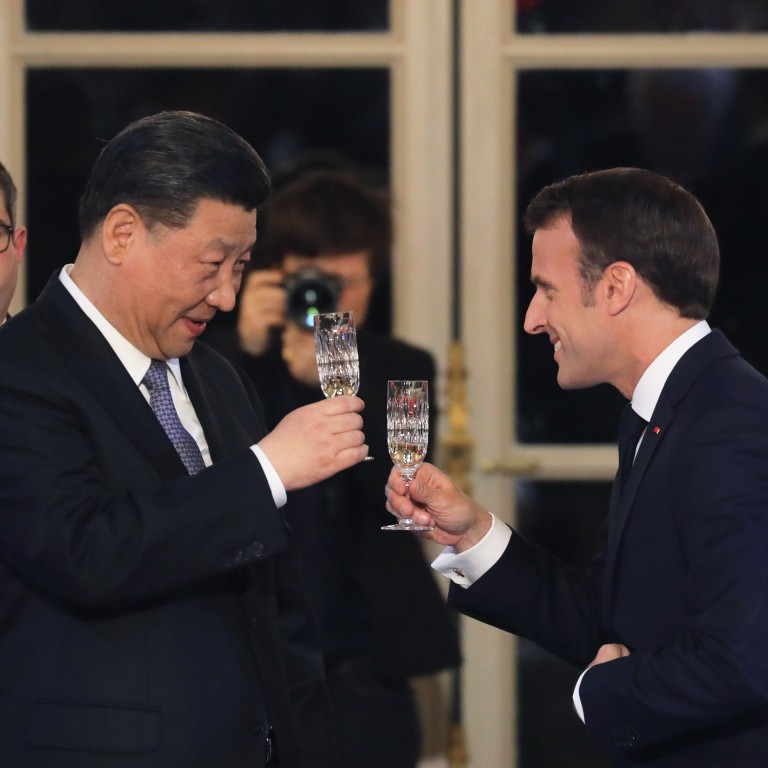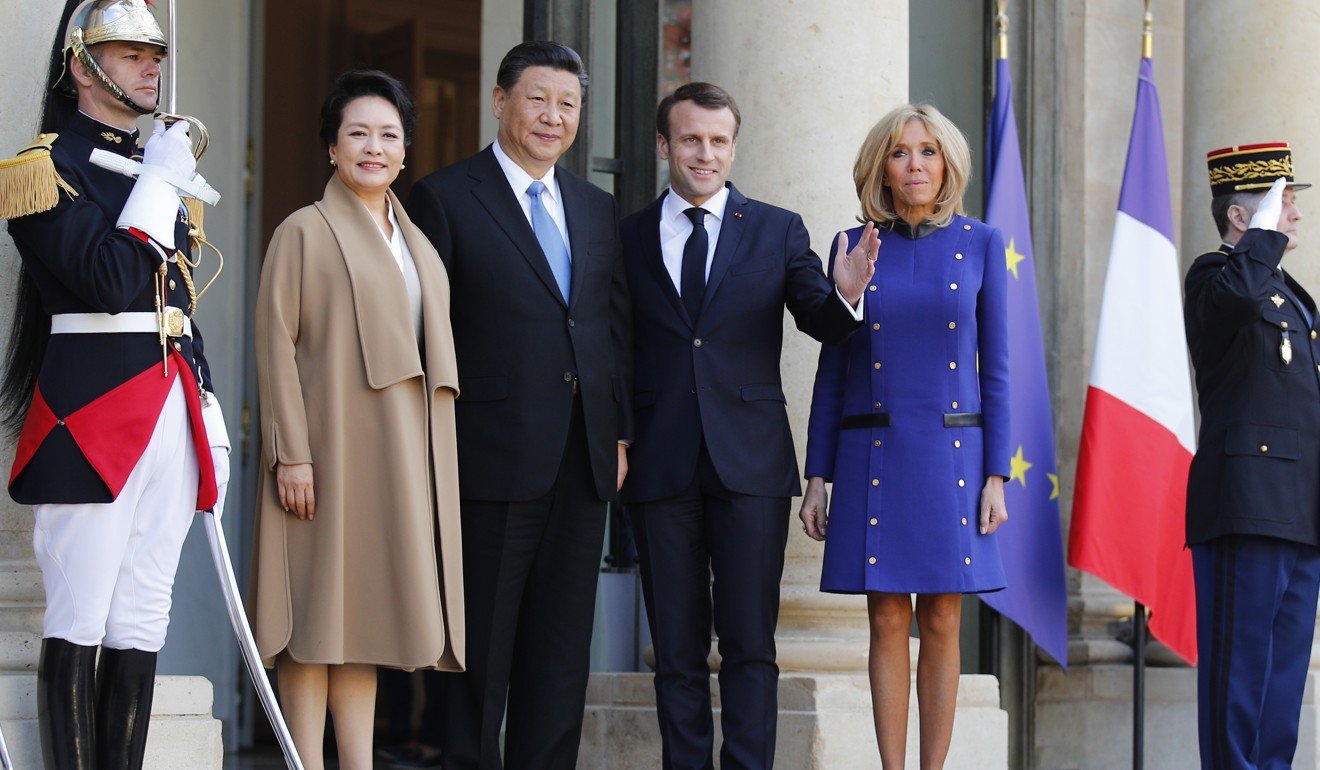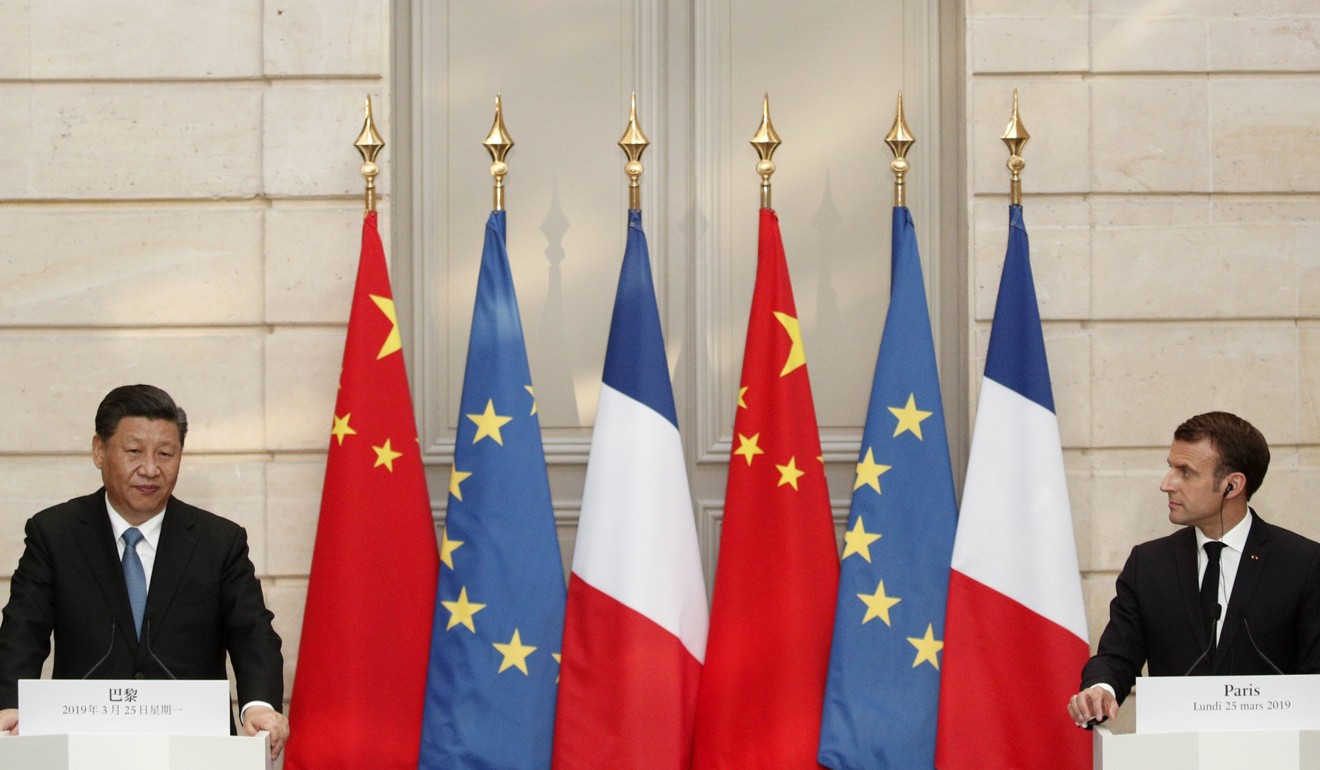
Europe-China political unity still far off despite Xi Jinping’s nimble diplomacy on tour
- Mathieu Duchatel writes that Chinese diplomacy worked in Rome with a divided Italy and in Paris with a Franco-German-EU coalition, but the problem of a lack of a political engine for Europe-China cooperation remained unsolved
Business is business, and politics set the stage for deals to be concluded – or not. The politics around Chinese President Xi Jinping’s state visit to France were far from auspicious. Beijing has several reasons to dislike the China policy of Emmanuel Macron:
- the French president’s endorsement of the Indo-Pacific narrative
- his reluctance to sign a Silk Road memorandum of understanding
- his constant insistence on the need for the “Belt and Road Initiative” to be a “two-way street”
- his strong push for European unity in dealing with China
- his restrictive approach to high technology transfers
- his support for European mergers in the industrial sector to compete with Chinese state-owned giants
This, in the language of Chinese foreign policy, amounts to a lack of “strategic trust”.
But distrust had zero impact on the conclusion of 15 major commercial deals in aeronautics, shipping, wind energy, waste treatment and banking. The two sides plan for the next chapter of their space cooperation, and China’s 2015 embargo on imports of French poultry was lifted.
Europe brings down the barriers for Xi Jinping in Paris
China’s decision to order 300 Airbus planes is clearly driven by the growth needs of China’s domestic airlines, but the timing of the announcement of these mega contracts is always highly political. Clearly there was an intention to create a positive atmosphere in Paris and it worked to some extent. It could have been otherwise.
These commercial deals reflect mutual corporate interests but also a Chinese effort to build trust on this state visit to France.

But the attention they have received in the media is proportional to the lack of concrete deliverables on the political front.
From that perspective, Xi’s European tour provides three important lessons on the current state of Europe-China relations.
First, there is an undeniable acknowledgement by Beijing that mutual economic interests can be pursued outside the framework of the belt and road plan.
A divided Italian government criticised by its domestic media presented a weak face to China, signed a belt and road memorandum of understanding in an atmosphere of crisis, and got very little reward in return. In contrast, a French government orchestrated a successful visit despite cold politics with China.
This suggests that countries dealing with China should concentrate their foreign policy resources on the negotiation of actual deals, rather than in endless inward-looking drama regarding whether to endorse China’s belt and road terms for international engagement.
Europe needs to protect its own amid China’s port buying spree
Second, the focus on commercial deals risks reducing Europe-China interactions to bilateral economic interactions. Is this in the interest of China?
On the one hand, China promotes a vision of relations with Europe as being essentially a matter of trade and investment, without strategic confrontation, and with politics almost seen as nuisance.
On the other, since the 2003-04 European hesitations regarding lifting the arms embargo, there is diffuse hope in Beijing that one day Europe will break ranks with the United States and side with China on strategic issues.

Today, the issue that dominates Europe-China political discussions is the architecture of global governance.
Xi’s Paris visit was another demonstration of the extreme difficulty for China and Europe to agree on a road map of action beyond principled statements on critical issues ranging from the global reduction of carbon emissions and the reform of the World Trade Organisation to the regulation of cyberspace.
The EU’s China strategy puts European unity to the test
In this context, the traditional international security agenda received very little attention, a sign of fundamental divergence between China and France, two important stakeholders in many international crises.
It remains to be seen whether Xi’s trip will have any effect on the mainstream view in Europe, which is to suspect China of only paying lip service to multilateralism.
Xi’s state visit to France ended on a positive note despite the quasi impossibility to agree on an international agenda of cooperation
Despite intense exchanges in Paris, this European perception will not easily be changed by postures; only concrete actions undertaken by China could have a decisive impact.
On this, as Macron said, the “era of European naivety is over”. But it remains puzzling to many Europeans that China is not seizing a leading role in combating climate change when China’s global status could benefit so much from such a move.
Xi urges France to help build trust with China
Third, in a positive development for Europe, Xi has accepted the European format proposed by France for political consultations.
It is unnatural for a Chinese leader to hold an exchange with the German chancellor and the president of the European Commission during a state visit to France.
This quadrilateral discussion followed the release of a China policy document by the European Commission describing China as a “systemic rival”.
The impression of a Franco-German endorsement for such a framing was thus inevitable. There was no denial on China’s side, just a nuance as Xi preferred a market economy term, “positive competition”, to describe the relationship.
In sum, Xi’s state visit to France ended on a positive note despite the quasi impossibility to agree on an international agenda of cooperation.
Chinese diplomacy took Europe as it is, working in Rome with a divided and weakened Italy, in Paris with a Franco-German-EU coalition, treating the latter slightly better from the perspective of commercial deals.
This clearly does not solve the problem of a lack of a political engine for Europe-China cooperation, not does it solve the numerous divergences between China and Europe on political values, governance models and the state of international affairs.
Mathieu Duchâtel is director of the Asia programme at Institut Montaigne in Paris
